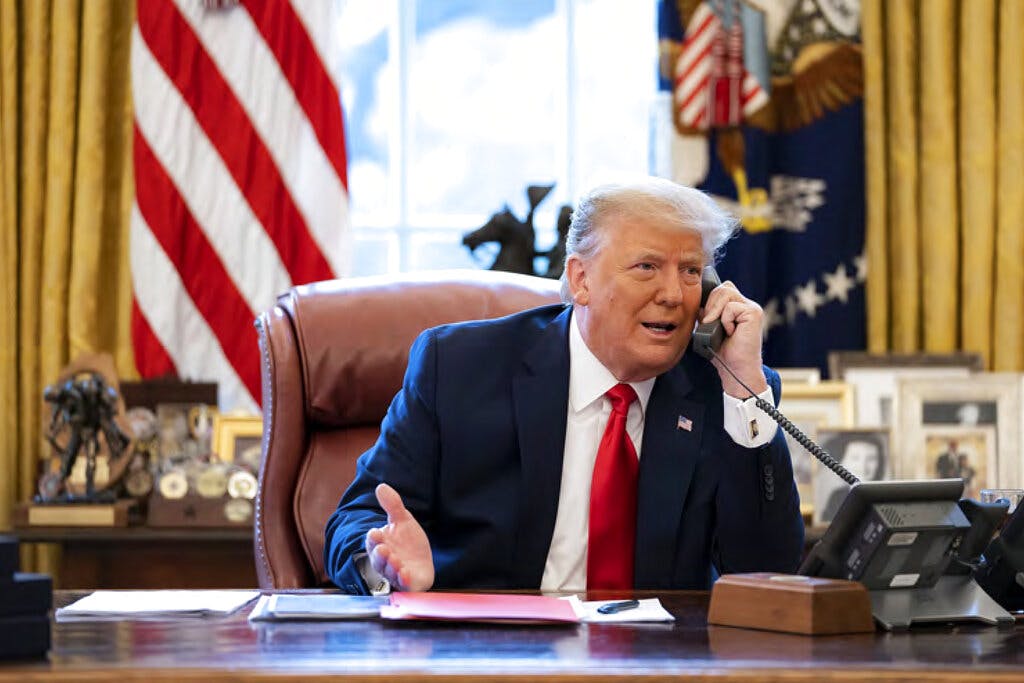For Trump, a Summer of Discontent — and Possibly Double Jeopardy — Looms in Georgia as He Faces Two Likely Indictments Over Election Interference
Jack Smith and Fani Willis appear set to collide in the Peachtree State.

The empaneling in Georgia this week of a grand jury that will be tasked with weighing whether to hand up charges against President Trump could put District Attorney Fani Willis on a collision course with Special Counsel Jack Smith. While he lurks in Washington, all eyes are on the Peachtree State.
The overlap between the two investigations — one federal, the other state — raises not only the prospect of a prosecutorial turf war, but also the specter of double jeopardy for Mr. Trump, whose legal exposure appears to lengthen by the day. The potential choreography between Ms. Willis and Mr. Smith is set to surface a lesson in federalism and criminal law.
Ms. Willis and Mr. Smith are both investigating what she calls “attempts to influence the administration of the 2020 Georgia General Election.” Mr. Smith, with a grand jury of his own at the District of Columbia, has spoken to Mayor Giuliani and the Georgia secretary of state, Bradley Raffensperger, two protagonists in the Georgia post-election drama. That is ground the district attorney has covered, as well. She has signaled that charges could come next month.
The points where Ms. Willis’s and Mr. Smith’s probes appear to be converging include a phone call in which Mr. Trump told Mr. Raffensperger, “I just want to find 11,780 votes, which is one more than we have,” as well as efforts to appoint an alternative slate of electors to deliver Georgia’s 16 electoral votes to Mr. Trump.
The Constitution’s Fifth Amendment ordains, “[N]or shall any person be subject for the same offense to be twice put in jeopardy of life or limb.” The prohibition is an ancient one, detectable in Roman law and lifted up by the Framers from English common law. The Supreme Court explains that it “represents a fundamental ideal in our constitutional heritage.”
The doctrine is simple in spirit, but often thorny in application. The Supreme Court, in Blockburger v. United States, articulated the test to apply when the “same act or transaction constitutes a violation of two distinct statutory provisions.” It is decisive whether “each provision requires proof of an additional fact which the other does not,” meaning whether the charges are distinct or overlapping.
If the same act, though, violates both state and federal law, double jeopardy does not apply — and both prosecutions can proceed.
In 1922, the high court explained that state and federal governments are “two sovereignties, deriving power from different sources, capable of dealing with the same subject matter within the same territory.”
While the justices have been asked to reject this approach, known as the “dual-sovereignty” doctrine, they have reaffirmed it as rooted in a “chain of precedent linking dozens of cases over 170 years.” As the Nine put it in 2019, “where there are two sovereigns, there are two laws, and two ‘offenses.’” Indian tribal courts are distinct sovereigns, but, say, Puerto Rico, is not.
Despite all that, the issue still simmers — and makes surprising judicial bedfellows. In a case that arose from Alabama, a man was twice and consecutively convicted under the aegis of the dual-sovereignty doctrine — once for carrying a gun in Alabama and a second time for carrying the same gun at the same moment in the United States.
The Nine allowed the double jeopardy, but only over the vociferous objections of — wait for it — Justices Ruth Bader Ginsberg and Neil Gorsuch. Justice Gorsuch, in a fiery dissent that invokes ancient Athens and the Hebrew Bible, writes that a “free society does not allow its government to try the same individual for the same crime until it’s happy with the result.”
That phone call to Mr. Raffensperger — and the notion to replace “duly certified” electors with those loyal to Mr. Trump, which appears to be of interest to both prosecutors, likely as a predicate for conspiracy charges — could thus do double duty, appearing in separate indictments signed by Mr. Smith and Ms. Willis.
Mr. Smith and Ms. Willis could bring, say, charges under the federal and state versions of the Racketeer Influenced and Corrupt Organizations Act, which provides for strict penalties for the activities of a criminal organization. Ms. Willis has expressed enthusiasm for Georgia’s version of that law, and has used it in pursuit of both public school teachers and chart-topping rappers.
A version of this bifocal reality has already surfaced in New York, where District Attorney Alvin Bragg’s 34-count indictment of Mr. Trump centers on the same facts the Department of Justice marshaled to extract guilty pleas from a former attorney, Michael Cohen, who is now a central prosecution witness. The DOJ declined to indict Mr. Trump, who was then a sitting president.
Mr. Trump could regain that status in 2024 — even if convicted on one or more charges — in which case the distinction between federal and state charges could make a difference. The Constitution grants the president the unfettered “Power to grant Reprieves and Pardons for Offenses against the United States,” which encompasses federal crimes, but not state ones. The next time a president attempts a self-pardon, though, will be the first time.

